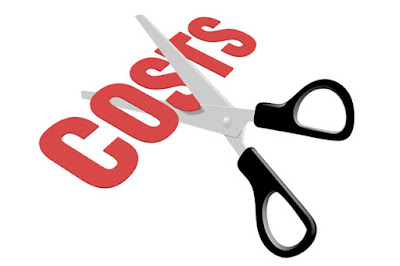Even though
we are just past the midpoint of 2017 there is still time to make improvement in your finances before year-end.
Five areas
that can make the biggest difference in your financial life right now include cutting
costs, automating and diversifying your investments, paying down debt, making
more money, and planning for the things you want.
According to
the paradox of choice, when we have too many options or goals we end up never
focusing on any of them.
Instead of
getting overwhelmed by thinking about all the financial questions and ideas you
may have, concentrate on the following five suggestions which will create big wins for you in 2017.
Cut Costs
Cut costs everywhere!
Start by assessing
your biggest costs first, like your mortgage, rent, or car payment, as there
will be the most room for cash to be freed up by reviewing these big ticket items.
Also, try to
find any recurring costs, purchases or subscriptions that collectively amount
to a large sum of money which can probably be used for better purposes like saving, paying off debt, and even “fun” spending.
For example,
instead of being a member of two wine clubs or multiple clothing line
subscriptions cut your enrollment down to one of each and free up money so you
can get your daily Starbucks without feeling any guilt and still have some cash left over.
You can have
the best of both worlds!
After all,
it's your money and you decide where it goes.
Pay Off Debt
Getting rid
of debt is essential to creating wealth.
The debts
you take on are your liability which becomes someone else’s asset. Your goal
should be to only take on the small, necessary debts personally and let someone
else pay for larger debts.
Paying off
your high-interest credit card debt is one of the easiest places to start. The
interest on outstanding credit card debt is compounding at a faster rate than
your savings account.
As a result,
you are actually better off taking money from your savings, which is probably
earning around 1% interest, and using that money to pay off credit card debt
that is costing you anywhere from 15-25% annually in interest!
If your
credit card is paid off in full each cycle, then focus on other debts like a
car payment, student loan, or your mortgage. Make it a priority to pay off a
little bit extra every month. Hopefully you can see how cutting costs will free
up the money that will enable you to make these additional payments.
Also, call
your lender and see if you can optimize your regular payments to rid yourself
of the debt sooner.
For example,
since paying off debt will take time, refinancing your debts at a lower rate and
shorter term to maturity can help expedite the payoff schedule.
Given our
current point in the economic cycle, you should make it a priority to refinance
soon before interest rates increase any further.
Automate and Diversify Your
Investments
Don’t wait
to invest!
There is an
opportunity cost when you miss out on the effect of compounded wealth.
Today there
are plenty of websites and apps that can help you automate an investment plan.
Some, like Acorns, even take spare change or “round ups” on every purchase and
use that money to fund an investment account for you.
However, the
easiest option for most individuals is to use a company-sponsored 401K plan.
Typically this 401K will have a matching component where your employer
contributes an additional amount to your bi-weekly investments. In other words,
by participating in a 401K plan you get free money!
Whether you
are investing on your own or through a 401K you need to use simple, low-cost
investments like Exchange Traded Funds (ETF’s). You may be more familiar with
mutual funds but ETF’s are better products that offer the same diversification
benefits.
Just as flat
screen TV’s replaced the old boxy TV’s, ETF’s are also replacing mutual funds
due to their innovative, low-cost investment solutions.
Make More Money
While
cutting costs is an easy way to make more money immediately, creating additional income sources for yourself and your family should be a work-in-progress
and long-term goal.
Think about the
ways you can monetize the skills you have acquired through your education,
profession or personal interests by starting a side hustle.
The
freelance economy is full of opportunities for writers, consultants, graphic
designers, teachers, video editors, and countless other interests. Build up
your portfolio of projects and start marketing it to companies that already do
similar work.
Additionally,
you can acquire new and relevant credentials or skill sets for your current
career and be able to leverage them in salary negotiations or get a higher
paying job elsewhere. As Warren Buffett says, “the more you learn, the more you
earn.”
Ultimately,
making more money through cutting costs, creating income from a side hustle, or
learning more valuable skills will create a system for you to have more money to save and invest thereby facilitating your ability to compound and grow your
wealth over time.
Create the Life You Want
Take time to
envision what you want your financial life to look like by the end of 2017.
Be creative.
Write out a few big goals that scare you but are realistic to accomplish if you
take the right steps.
This may
include paying off debt, getting a salary increase, having a certain number of
new clients for your side hustle, starting investing, or something else.
No matter
what the goal may be it is uniquely your own. You must take time to visualize
and plan for it.
The goals
will not complete themselves. It is up to you to take action. So go learn, do,
and create what you want.
As always,
if you have questions or comments, feel free to send me a message. Thanks for
reading.
John





Comments
Post a Comment